FYI: If you buy something through a link on this site I may earn a commission - at NO extra cost to you.
About Dog Incontinence
Dog incontinence is fairly common, and can happen to any dog, regardless of age or sex.
If your pet is incontinent it means that she is unable to control her bladder and/or bowels. Most of the time it's her urine that she'll have difficulty with, it's pretty rare for bowel movements to be a problem.
Sometimes her loss of control will be a one-off episode, other times it's a chronic problem, but it is always uncomfortable and messy, and often worrying too.
Before you can decide on the best way to help your dog, you need to know why she/he is having trouble in the first place.
Although female dogs are more likely to have this issue, male dogs can too. Older dogs are also higher-risk for incontinence issues, but it can happen with puppies and dogs of all ages.
Incontinence shouldn't be confused with puppy potty training 'accidents'. Young puppies haven't developed bladder or bowel control and need time to mature and learn, but it takes time!
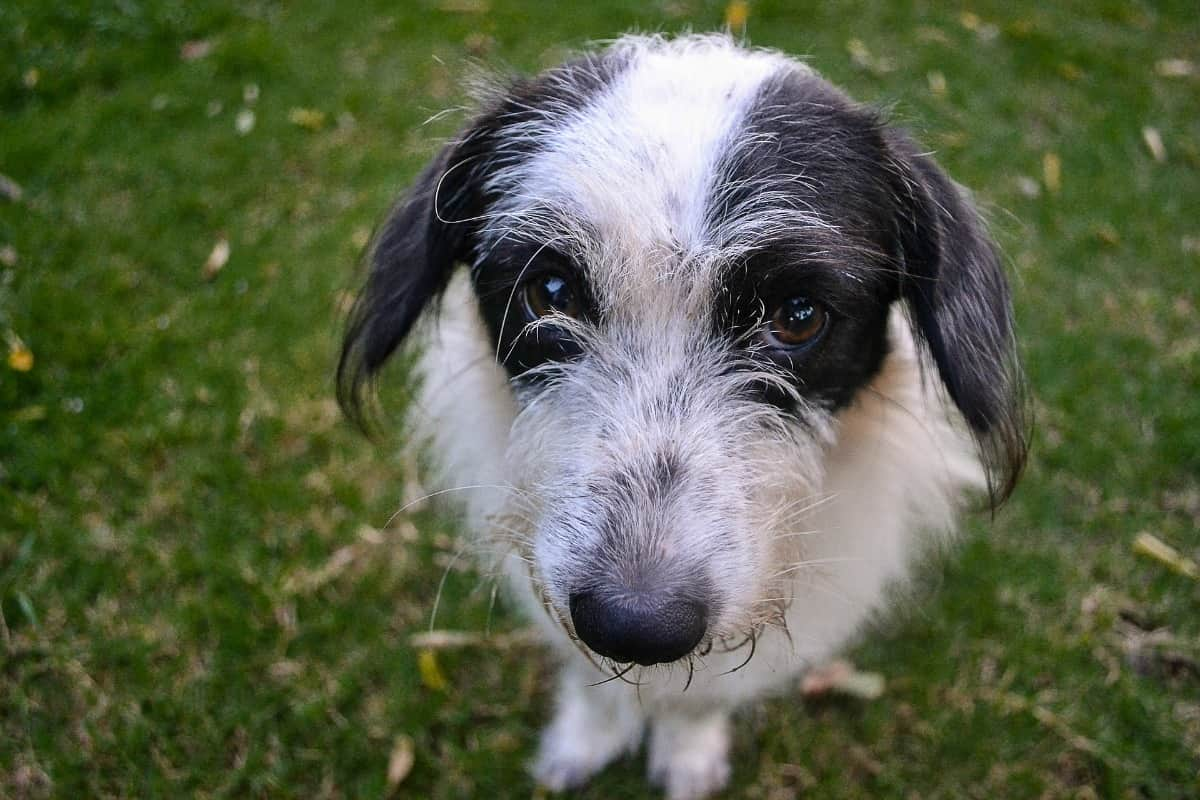
What Causes Incontinence In Dogs?
There are several different reasons why a dog can have difficulty controlling their urinary function.
Here are the most common ones (click on links to jump to relevant section):
For your peace of mind, puppy and dog health information on this site has been approved by veterinarian Dr. Megan Teiber, DVM
Urinary Tract Infection
This is very common, especially in females and in puppies, but can affect either sex.
Caused by bacteria which enters the urethra and then multiplies and spreads inwards. Untreated it could reach the kidneys and cause serious problems.
Often a UTI (also known as as a bladder infection or Cystitis) can occur when a pup's (or dog's) immune system is weakened, either by stress or illness.
This may be one of the reasons it's common in young puppies who have just left their momma and littermates, are also getting vaccinations, and are stressed by change.
A female pup gets much lower to the ground when peeing than a male pup usually does (making it easier for her urinary system to exposed to bacteria), plus her urethra is shorter than that of a male which means bacteria can travel to her bladder quickly.
Other conditions can cause recurring infections, these include bladder stones, an incorrect acid/alkali balance in the bladder, or a defect in the ureter or vulva. Diabetes or Cushing's Disease can also cause incontinence in dogs.
Or conditions such as tumors, bladder stones, prostate disease and more.
Occasionally a urinary stone or tumor blocks which has caused problems will suddenly completely block the ureter and your dog won't be able to pee at all.
This is a veterinary emergency as if it's not treated quickly your pet could die.
Symptoms of a UTI don't usually involve a flood or urine.
Your pup/dog is likely to have an urgent need to pee MUCH more often than normal, and sometimes she may only be able to squeeze out a drop or two.
Her urine may be cloudy or bloody and/or have a strong odor, and there's often a lot of licking at her privates and possibly some discharge.
To learn more about bladder infections in dogs (including symptoms, diagnosis and treatment options) CLICK HERE
Spay Surgery
This is the most common cause of 'leaky plumbing' in female dogs.
In this case the poor urinary control is usually due to the fluctuation in hormone levels which happens as a result of the procedure, but occasionally there can also be physical problems.
This is often called 'hormone-responsive incontinence'.
Various studies have come up with different figures in terms of the percentage of dogs who have incontinence issues after being spayed.
In 2009 one study suggested around 20% were affected, another survey in 2013 puts the figure at 5%.
My consultant, Dr. Megan Teiber, DVM, told me that she personally believes that many dogs with this type of urinary incontinence suffer so mildly or infrequently that many owners don't seek veterinary care.
I've owned many dogs over my lifetime, and am surrounded by dog-owning family and friends. I have not personally had a dog who had a problem with this after being spayed, nor do I know anyone who has.
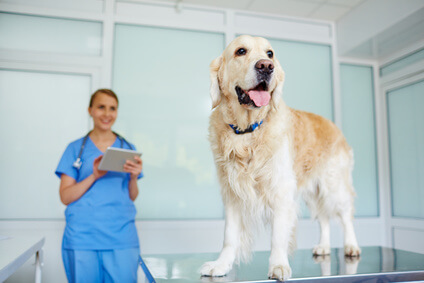
Hormone responsive incontinence in dogs often appears as a loss of control during sleep, which ends in Fifi wetting her bed.
But it could show as an inability to hold her pee for long, or as a constant/intermittent dribble of urine.
Some breeds are at higher risk of developing this problem than others. These include German Shepherds, Boxers, Doberman Pinschers, Old English Sheepdogs, Rottweilers, Weimeraners, Irish Setters and some Spaniels.
Also larger breeds are more prone to this problem, as are dogs who have their tails docked as puppies
* This can sometimes (but not often) happen in neutered male dogs too.
Find out how to treat a spay-related incontinence - CLICK HERE
Defects In The Urinary Tract
Physical malformations of any part of the urinary tract will usually mean that things don't work quite the way they should.
The most common defect in female dogs is a birth defect called an 'Ectopic Ureter'.
The ureter is a tiny tube down which urine flows from the kidneys to the bladder.
When a pup has an ectopic ureter, the tube bypasses the bladder and carries urine directly to the urethra (or sometimes to the vagina) instead, so there's no 'holding cell' as it were and the urine comes flows out unimpeded.
Ectopic Ureter is a hereditary condition and some breeds are more prone to it that others.
These include Labrador Retrievers, Siberian Huskies, Welsh Corgis, Collies, West Highland Terriers, Wire-haired Fox Terriers and Miniature Poodles.
Symptoms can include an almost continuous dribble of urine, or flooding/bed-wetting. Irritation and inflammation around the vulva is often seen too.
Learn how to treat urine leakage due to an Ectopic Ureter and more CLICK HERE
Neurological or Spinal Problems or Seizures
Neurological problems (to do with the nervous system) can interfere with the way your dog's urinary tract functions. Affects both males and females.
Spinal injuries or diseases (such as a spinal disc problem seen in long-bodied dogs like Dachshunds) or tumors can have the same effect.
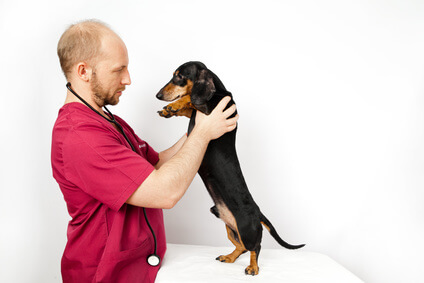
Brain tumors or brain injury or disease can do the same thing.
Basically the disease or damage interferes with the signals sent by the brain and incontinence can be one of the resulting problems.
If your dog has a seizure he'll lose control of his muscles and nervous system. This includes his bladder and bowels.
When not in the grips of a seizure, your dog's bladder control will be normal.
Canine Cognitive Dysfunction (aka 'Doggy Alzheimers') can sometimes cause an old dog to 'forget' their house-training skills or simply how to control their bodily functions.
To learn more about treating incontinence cause by neurological issues CLICK HERE
Illness, Disease & Syndromes
Sometimes a dog's leaky bladder is a symptom of another underlying condition.
These could include diabetes, kidney disease, liver disease, Addison's disease and Cushing's disease.
Symptoms will vary depending on what's causing the problem.
In that situation you need to treat the main disease or problem which should then relieve the symptoms, including incontinence.
Most diseases and problems affect both male and female dogs pretty equally.
Some medications (such as sedatives) can cause temporary incontinence, as can the lingering effects of anesthetic or strong pain-killers post-surgery.
To find out more about this CLICK HERE
Stress & Anxiety
You know the expression 'I was so scared I almost wet myself'? Well, in some cases dogs actually do wet themselves!
The most common type of incontinence in this category is submissive urination. This is an involuntary behavior and causes him/her to pee as a sign of submission.
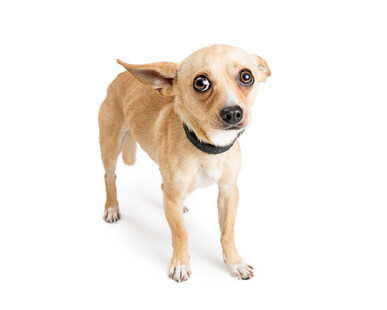
It's most often seen in puppies who are very gentle, or anxious. Affects males and females but tends to be seen slightly more often in females.
Separation anxiety is another emotional cause for loss of bladder control, often bowel control as well.
If your puppy or dog gets so anxious when you leave him that he becomes hysterical he may pee and/or poop uncontrollably.
This is not a gender-specific problem, boys are as likely to suffer as girls.
Read more HERE
Old Age
As your dog gets older, his/her bladder control may well get less efficient. This is usually due to a 'weak bladder sphincter'.
Sometimes it can be a delayed reaction to spay surgery, or the result of the diseases of old age such as kidney failure.
Other times it's simply part of the aging process, the overall weakening of muscles and the deterioration of bodily functions.
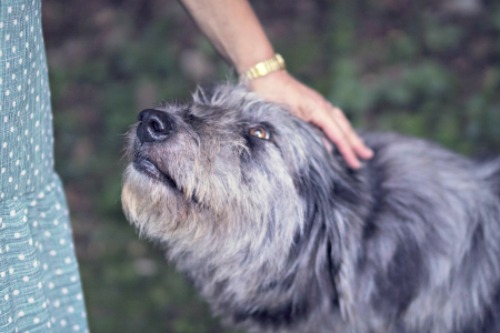
Canine Cognitive Dysfunction (the dog version of Altzheimer's Disease) can lead to a senior dog forgetting where they're supposed to eliminate, or when.
Hormone-related or spay incontinence affects females, but old age gets to all dogs regardless of gender.
If there is a specific medical cause for your older dog's weak bladder then by treating the root of the problem you will also improve the leaking.
But sometimes it's just a case of managing the problem and minimizing the discomfort for your dog and disruption for you.
For tips on managing incontinence in older dogs CLICK HERE
Click here to check out an article on dog incontinence which has been written exclusively for this website by Dr. Megan Teiber, DVM.
REMEMBER: Whatever the reason for your dogs leaky pipes, there's something you can do to help her feel better and minimize the mess and disruption.
Good luck to you both.
you might also like...
- Home
- Dog Health Information
- Dog Incontinence
FTC Disclosure: Some pages on this site contain affiliate links. I may earn on qualified purchases.






